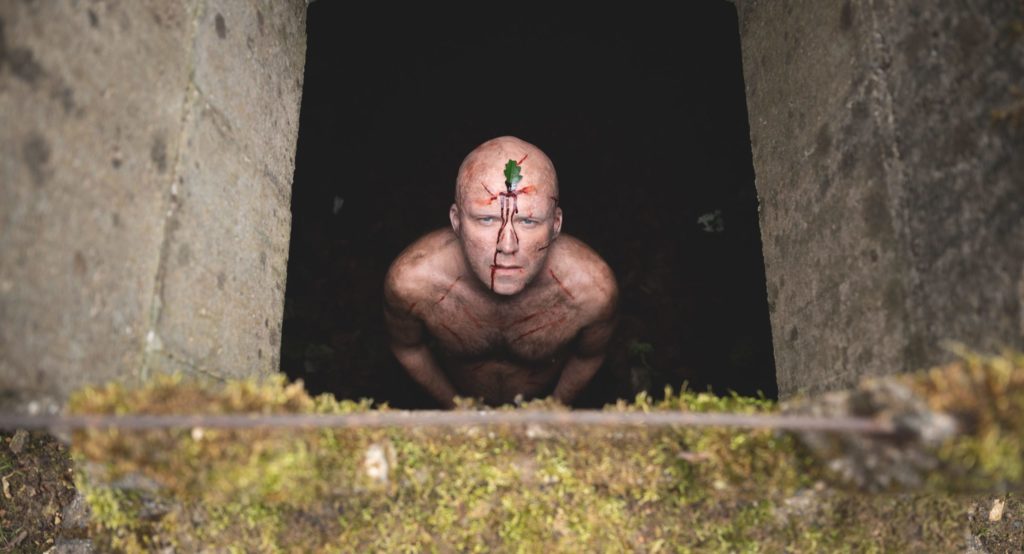
Men: An Impressive Experience
When it comes to choosing a seat for the theatrical experience, I always want to put myself in front of any cacklers, talkers, or narrators. I find it less distracting to have the folks who simply cannot shut up behind me, lest I get distracted by their impatient and/or otherwise fidgety silhouettes.
For a matinee of Men, I opted for the second row back from the screen. Competing against multiple summer blockbusters, Alex Garland’s film was playing in a smaller theater with an expectedly lower audience turnout.
I mention my seating preference because, with Garland’s work, there’s an unassuming, immersive quality to the images and sounds on display. Not unlike The Shimmer in his adaptation of Annihilation, there are countless instances where it felt as though I was being swallowed by the movie itself.
Men is the most nerve-wracking film I’ve seen so far in 2022. Some directors use 3D or IMAX as a crutch to get people “inside” their movies. If Garland’s work were projected in such a manner, the physical and psychological damage would be irreparable.
Tension in the Mundane
The most noticeable instance of Men‘s naturalistic immersion happens early on, when Harper (Jessie Buckley) wanders through the woods outside the property she’s rented for a fortnight. There she encounters a dark tunnel. The camera dollies in slowly from behind, her head blocking out the light on the other side. Surrounded by darkness, she seems to be guided inside the passageway. She makes noises that echo in hypnotic fashion.
Garland couches this sequence in the mundane: on the surface, it’s drawn-out and narratively peripheral. But the filmmaker knows how to create surprises from the mundane, exhibiting a sleight-of-hand that’s at once calculating and visceral.
Men conceives its own unique world. Comparisons could be made to Darren Aronofsky’s bombastic wank-fest, mother! but Garland is much subtler and more methodical. If anything, this would make a fine double feature with Herk Harvey’s 1962 spook-show, Carnival of Souls.
Conflicting Emotions
London-based Harper has lost her husband, James (Paapa Essiedu), and is looking to a stint of country isolation to recharge and heal. Her closest human contact is Geoffrey (Rory Kinnear), the landlord of the “500 year-old” home, while her best friend Riley (Gayle Rankin) checks in via FaceTime. The premises carry the look and feel of a relaxing wonderland, but Harper’s stay is soon interrupted by an ominous, ever-encroaching figure.
If Annihilation was a sci-fi/horror hybrid with themes of loss, estrangement, duality, and the fluctuation of human relationships, Men is a full-bore horror driven by guilt, confusion, and the myriad of conflicting emotions that inform human grief.
Whether it’s a parent, sibling, friend, or beloved pet, grief is a shit-storm of diametrically opposed emotions, thus making their outward expression a mass of incoherent frustration.
We see the details of Harper’s final encounter with James, and while the impetus for his suicide could be seen as a conflagration of emotion and impulse, it’s the lingering mind’s-eye images and the “what ifs” that plague her consciousness. Torturing oneself with the unknowable is an extremely bad headspace to occupy.
Cold and Calculating?
While Garland’s films exhibit a preoccupation with the purely technical aspects of filmmaking, the emotional pulse lies in the actions; the nuanced facial expressions; and the pockets of silence where characters – and the viewer – are left to speculate.
During Men‘s final act, I worried that Garland would steer the narrative into a place of disambiguation and finality. There is the dread of what the film builds toward, encompassed in one of the most bizarre setpieces of 2022 so far (until Crimes of the Future hits theaters, anyway)…but there is also the dread that accompanies simply not knowing.
The film gets great mileage out of Buckley’s performance – Harper is at once conflicted, confident, vulnerable, and willing to take action. Unlike Jennifer Lawrence in mother!, she’s not marginalized for allegorical purposes, nor is she simply a vessel to have torment inflicted upon. She’s an heir apparent to the headstrong Mary Henry (Candace Hilligoss) in Carnival of Souls, actively trying to figure out the root of what haunts her, even if said root lies outside the realm of conventional reality.
Kinnear also deserves mention. His real and digitized likeness informs multiple characters: Geoffrey; a local vicar; a pub owner and patron; and a policeman. In an interesting touch, Geoffrey’s overbite is reminiscent of Winfried’s in Toni Erdmann – a film about a father taking on a revolving door of different costumes and personae to connect with his estranged daughter.
A Uniformity of Fear
Garland uses these character types to create an imposing and authoritative tone, suggesting a uniformity of fear. Even the most innocuous encounters carry a sense of creeping, otherworldly dread.
What’s curious is how Harper doesn’t show any recognition toward the men appearing to be the same person. Therefore, is it a construct of Harper’s imagination, or merely Garland attempting to throw the viewer off-balance? In a movie filled with seemingly incongruous moments, either option feels appropriate.
The use of religious imagery to convey a sense of guilt and blame is firmly in league with Mary Henry’s cynical non-believer (“I’m not taking the vows, I’m just playing the organ”). In a world where Harper is the lone female (save for Riley and a female police officer who disappears after a single scene), all advice, support, and intimidation stems from the opposite sex.
That said, Garland doesn’t turn the proceedings into a heavy-handed, incendiary screed on gender politics. He favors a deliberate pace that conveys information more through sound and image than actual dialog. The test-audience tokenism that seems to inform every Blumhouse production is nowhere to be seen. That alone makes Men a refreshing, albeit unsettling, trip.
And the fact that A24 would give this a wide release – sandwiched between Top Gun: Maverick and Doctor Strange and the Multiverse of Madness, no less – speaks to their willingness to shake up the drab uniformity of the modern multiplex experience.
4.5 out of 5 stars
The Plot Sickens: Jonny Numb flays himself over The Texas Chainsaw Massacre!
Crash Analysis Support Team

Jonny Numb
Jonny Numb (aka Jonathan Weidler) is only unstoppable when it comes to word count. He co-hosts The Last Knock horror podcast with Billy Crash, and his writing can also be found at The Screening Space.
THE LAST KNOCK horror podcast is a Crash Palace Productions’ featured show. Besides this site, you can find THE LAST KNOCK on iTunes and Spotify and more, with new shows posted every other Sunday at 9 PM ET.
Crash Palace Productions website design and creation from Brian Yount Digital Enterprises with banner and THE LAST KNOCK art from Palko Designs. Logo designs from Paul Belci.
(Men movie still from A24.)
